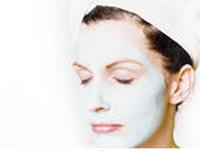|
Old age isn't so bad when you consider the alternative. Maurice Chevalier |
Skin and the sense of touch
|
|
Under our skinThe skin is often known as "the largest organ in the human body". This applies to exterior surface, as it covers the body, appearing to have the largest surface area of all the organs. Moreover, it applies to weight, as it weighs more than any single internal organ, accounting for about 15 percent of body weight. For the average adult human, the skin has a surface area of between 1.5-2.0 square metres, most of it is between 2-3 mm thick. The average square inch of skin holds 650 sweat glands, 20 blood vessels, 1000 melanocytes, and more than a thousand nerve endings. Skin is composed of the epidermis and the dermis. Below these layers lies the hypodermis(subcutaneous adipose layer), which is not usually classified as a layer of skin. The main cell types of skin are fibroblasts, adipocytes (fat storage) and macrophages. Sebaceous glands are exocrine glands which produce sebum, a mixture of lipids and waxy substances: lubrication, water-proofing, softening and antibactericidal actions are among the many functions of sebum. Sweat glands open up via a duct onto the skin by a pore. The hypodermis is not part of the skin, and lies below the dermis. Its purpose is to attach the skin to underlying bone and muscle as well as supplying it with blood vessels and nerves. It consists of loose connective tissue and elastin. The main cell types are fibroblasts, macrophages and adipocytes (the hypodermis contains 50% of body fat). Fat serves as padding and insulation for the body. The skin must be regularly cleaned. Unless enough care is taken it will become cracked or inflamed. Unclean skin favors the development of pathogenic organisms. The constantly peeling off dead cells of the epidermis mix with the secretions of the sweat and sebaceous glands and the dust found on the skin to form a filthy layer on its surface. If not washed away the dirt and dead skin slurry begins to decompose emitting a foul smell. Functions of the skin are disturbed when it is dirty and it becomes more easily damaged. The release of antibacterial compounds decreases. Dirty skin is more prone to develop infections. Cosmetics should be used carefully because these may cause allergic reactions. Each season requires suitable clothing in order to facilitate the evaporation of the sweat. Sunlight, water and air play an important role in keeping the skin healthy. Take care of your skinYour skin is your armor, your shield from the elements. Yet when was the last time you really thought about what you need to do to take care of it? Throughout your life, genetic and environmental factors will cause a lot of wear and tear to your skin. But you are never too young or too old to start taking care of your skin. You are never too young or too old to start taking care of your skin. In fact, skin care and protection should be an essential part of your health, fitness, and beauty regime. A skin care routine does not have to be elaborate in order to be effective. But you should develop some kind of skin care routine based on your skin type, daily activities, and nutritional needs so that you can be sure you are taking the very best care of your skin. Following a daily skin care regime will also allow you to more closely evaluate your skin for abnormalities. Wash your skin thoroughly on a daily basis to remove the dirt, debris, pollutants, and perspiration that accumulates on a daily basis. If you have dry or sensitive skin, use only warm water to wash your skin and use a mild natural cleanser every few days. If you have normal or oily skin, be sure to wash with a gentle cleanser on a daily basis. Be sure to brush your teeth before washing your face, as toothpaste residue can irritate sensitive facial skin. Unless your skin is very oily, you will want to use a moisturizer everyday to keep your skin hydrated and healthy. Your skin needs moisturizer all year long as both the indoor winter heat, and summer sun can be equally damaging to your skin. Use a natural sunscreen when possible, regardless of whether or not you plan on spending much time in the sun. The sun's rays are very damaging and if you get in the habit of applying sunscreen everyday, you will never be left without protection. The suns most beneficial rays occur at sunrise and sunset. Apart from the services offered at skin clinics, many creams, gels and ointments that claim to treat acne, diminish sun or age spots and enhance skin elasticity are widely available in the market. There are scrubs, cleansers, masks, over-the-counter skin medicine and skin peel formulations, all offered at various price ranges. Most can be bought at department stores or drugstores, but the fact is that very few of these so- called miracle products actually work. Why is it that practically everyone in the middle class to the upper levels of demographics in any country are worried about getting wrinkles? Maybe it is the fear of getting old or looking old, or the wanting to look socially acceptable, or just plain vanity. We all have our own reasons. But whatever it is, everyone is united in wanting to solve this age old problem. However, in the first place, do we even have any idea about what actually causes these dreaded wrinkles? It's highly probable that we don't. The most important factor in finding a solution to any problem is finding out the root cause of it. Over the years, beauty experts and skin doctors have come up with a vast array products to treat and minimize wrinkles. Anti-wrinkle creams and ointments help reduce the appearance of wrinkles and prevent new ones from forming. These wrinkle ointments and anti-aging creams help a lot in restoring the skin's firmness and elasticity. In addition, these products contain anti-oxidants and retinol that not only aids in reducing wrinkles and fine lines on the skin, but also stimulates collagen production. For people seeking solutions to severe damage that has already been done to the skin, there are a number of treatments available ranging from chemical peels and dermabrasion to the latest and technologically advanced, computerized laser resurfacing. However, many people looking for skin repair are hesitant to try chemical or laser peels due to the painful procedure and long recuperation period they have to undergo. The results of these procedures however, are fantastic. One less painful procedure is the particle skin resurfacing procedure. The process is removes the outer layer of skin in a highly controlled manner. Because of its preciseness, it is practically painless. By repeating this procedure a number of times, the younger skin moves to the surface, thus promoting visible changes in the skin's texture, color and appearance. The benefits of this skin resurfacing procedure are that it causes very little pain or discomfort, no recuperative period is needed, there is minimal risk, it can be used for all skin types, and no anesthesia is required. While it is true that physical beauty is just skin deep, it is still no reason why people, particularly women, should disregard basic skin care. Since the skin is our outermost layer, it is exposed to the harsh elements of the environment. And because it is not uncommon for people to base judgments from our cover, with the face being the first thing they look at, it is only proper that we go to great lengths to keep our skin looking clean and fresh.
Terms and definitions on this pageEpidermis Hypodermis Pimples Ultraviolet radiation Health tips and advises for everybody.
|

